新概念1第92课
(完整版)新概念第一册Lesson91-92
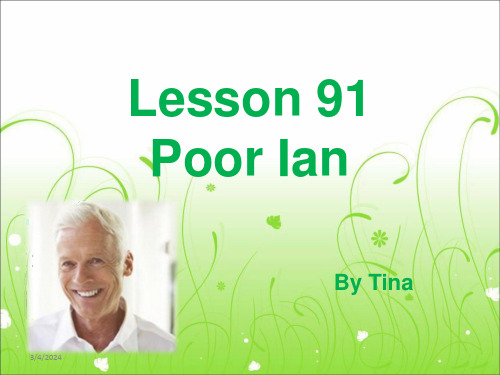
come to work→work等
• 现在完成时可表示持续到现在的动作或 状态,动词一般是延续性的,如
• live, teach, learn, work, study, know.
• 过去时常用的非持续性动词有: • come, go, leave, start, die, finish,
become, get married.
特疑词+ have (has)+主语+p.p?
(2) 表示动作发生在过去某个不确定的时间, 但对现在留下了某种影响和结果。 常被just、already、yet 等副词修饰。
-Have you had lunch yet? 你(已经)吃午饭了吗? -Yes, I have. I‘ve just had it. 我刚刚吃过。(现在我不饿了)
(强调动作,过程)
move out (of) 搬出来
move away
搬走
move from…to…
从…搬到…
②感动,打动
This story moved me. 这个故事感动了我。 The news moved him very much. 这消息使他很感动。
Байду номын сангаас
★ miss [mis] v. 想念,思念
★ person ['pə:sən] n. 人
He is a nice/good person. 他是个好人。 in person 亲自,直接的 He will go to get the money in person. 他将亲自去取钱。
★ personal adj. 个人的,私人的
['pə:sənəl]
• The patient is lying still. • 病人安静地躺着。
新概念英语第1册第91-92课课重点语法

新概念英语第1册第91-92课课重点语法第91-92课的内容:一、重要句型或语法1、一般将来时表示将来会发生的动作或状态,形式为will do,如:He will come here tomorrow./ They will be in Shanghai next week.二、课文主要语言点Has Ian sold his house yet? Yes, he has. 1)可简单复习一下现在完成时的内容。
2)注意人名Ian的发音He sold it last week. 1)可提问学生为什么此处动词要用一般过去时。
2)注意sell的过去式和过去分词都是sold。
Has he moved to his new house yet? No, not yet. 1)注意对比本句中的move to(搬到)和下文中的move into(搬进,要接宾语)和move in(搬进,不接宾语)的区别。
2)not yet,还没有。
He's still here. He's going to move tomorrow. 可复习be going to do的用法,同时对比与will do的区别:be going to do侧重表达主观打算或意愿。
When? Tomorrow morning? No. Tomorrow afternoon. 两个问句都采用了简略形式,因为口语中往往无需重复上文已经明确的信息,回答也采用简略形式。
完成问句应该是:When is he going to move? Is he going to move tomorrow morning?I'll miss him. 注意提醒will do的缩略形式:'ll do。
He has always been a good neighbour. 本句话可以作为常用句型识记运用:sb. has always been a good ...。
新概念第一册91-92课知识点
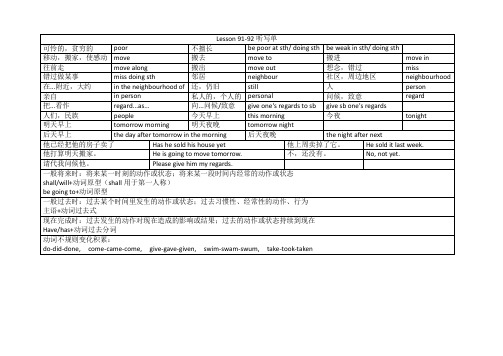
可怜的,贫穷的
poor
不擅长
bepoor at sth/ doing sth
be weak in sth/ doing sth
移动,搬家,使感动
move
搬去
moveto
搬进
movein
往前走
movealong
搬出
moveout
想念,错过
miss
错过做某事
missdoing sth
givesb one's regards
人们,民族
people
今天早上
thismorning
今夜
tonight
明天早上
tomorrowmorning
明天夜晚
tomorrownight
后天早上
theday after tomorrow in the morning
后天夜晚
thenight after next
Have/has+动词过去分词
动词不规则变化积累:
do-did-done, come-came-come, give-gave-given, swim-swam-swum, take-took-taken
一般将来时:将来某一时刻的动作或状态;将来某一段时间内经常的动作或状态
shall/will+动词原型(shall用于第一人称)
be going to+动词原型
一般过去时:过去某个时间里发生的动作或状态;过去习惯性、经常性的动作、行为
主语+动词过去式
现在完成时:过去发生的动作对现在造成的影响或结果;过去的动作或状态持续到现在
邻居
neighbour
新概念英语第一册第91-92课-Poor-Lan
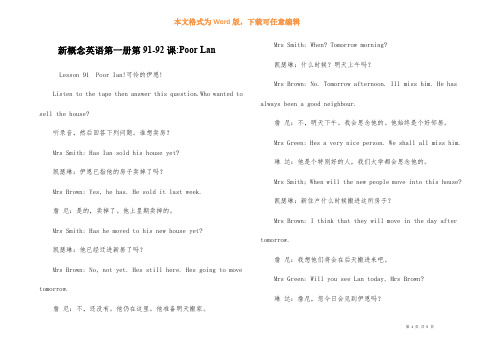
新概念英语第一册第91-92课:Poor LanLesson 91 Poor Ian!可怜的伊恩!Listen to the tape then answer this question.Who wanted to sell the house?听录音,然后回答下列问题。
谁想卖房?Mrs Smith: Has Ian sold his house yet?凯瑟琳:伊恩已指他的房子卖掉了吗?Mrs Brown: Yes, he has. He sold it last week.詹尼:是的,卖掉了。
他上星期卖掉的。
Mrs Smith: Has he moved to his new house yet?凯瑟琳:他已经迁进新居了吗?Mrs Brown: No, not yet. Hes still here. Hes going to move tomorrow.詹尼:不,还没有。
他仍在这里。
他准备明天搬家。
Mrs Smith: When? Tomorrow morning?凯瑟琳:什么时候?明天上午吗?Mrs Brown: No. Tomorrow afternoon. Ill miss him. He has always been a good neighbour.詹尼:不,明天下午。
我会思念他的。
他始终是个好邻居。
Mrs Green: Hes a very nice person. We shall all miss him.琳达:他是个特别好的人,我们大学都会思念他的。
Mrs Smith; When will the new people move into this house?凯瑟琳:新住户什么时候搬进这所房子?Mrs Brown: I think that they will move in the day after tomorrow.詹尼:我想他们将会在后天搬进来吧。
Mrs Green: Will you see Lan today, Mrs Brown?琳达:詹尼,您今日会见到伊恩吗?Mrs Brown: Yes, I will.詹尼:是的,我会见到他。
新概念英语第一册(美音版)Lesson 92听力
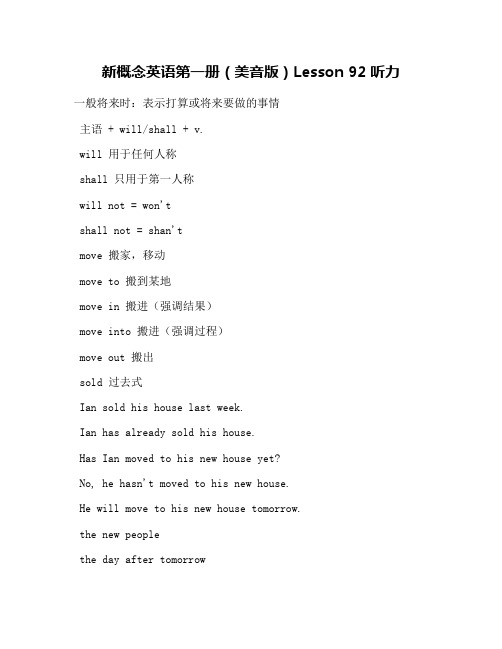
新概念英语第一册(美音版)Lesson 92听力一般将来时:表示打算或将来要做的事情主语 + will/shall + v.will 用于任何人称shall 只用于第一人称will not = won'tshall not = shan'tmove 搬家,移动move to 搬到某地move in 搬进(强调结果)move into 搬进(强调过程)move out 搬出sold 过去式Ian sold his house last week.Ian has already sold his house.Has Ian moved to his new house yet?No, he hasn't moved to his new house.He will move to his new house tomorrow.the new peoplethe day after tomorrowThe new people will move into the house the day after tomorrow.leaveI will leave tomorrow.Will you leave next week.miss 想念,思念I will miss you.Will you miss me?I won't miss you.neighbour 邻居all the neighbours 所有的邻居All the neighbours will miss Ian.Ian is a good neighbour.Ian was a good neighbour.Ian has always been a good neighbour.We will all miss him.was/beenLucy is a good wife.She was a good wife.She has always been a good wife.将来时的时间todaytomorrowthe day after tomorrowthis morningtomorrow morningthe day after tomorrow in the morning this afternoontomorrow afternoonthe day after tomorrow in the afternoon this eveningtomorrow eveningthe day after tomorrow in the evening tonighttomorrow nightthe night after nextExerciseswe will = we'llthey will = they'llhe will = he'llshe will = she'llit will = it'llI will = I'llExercises B:Example:It rained yesterday.Yes, and it will rain tomorrow, too.rain/ snow/ leave/ get up/ arrive/ finish work/ have a holiday/ drive Homehave a haircut/ telephone me/ have a shave/ pack his bags/ sweep the floorpaint this room/ repair my car/ make an appointment1 Yes, and it will snow tomorrow, too.2 Yes, and he will get up late tomorrow, too.5 Yes, and she will drive to London tomorrow, too.6 Yes, and she will telephone him tomorrow, too.7 Yes, and he will have a shave tomorrow, too.8 Yes, and she will sweep the floor tomorrow, too.将来时1 be going to ……2 现在实行时的第三种情况3 一般现在时(表示移动的动词)I will leave tomorrow.I am going to leave tomorrow.I am leaving tomorrow.I am about to leave.I am to leave tomorrow.一般疑问句:Do you come?Do you come tomorrow?(也可表示将来) be to do sth.be about to do sth.(介词短语)She is (about) to come/leave/move.be going to do sth.be doingbe to do sth.。
新概念英语第1册第91-92课课重点语法
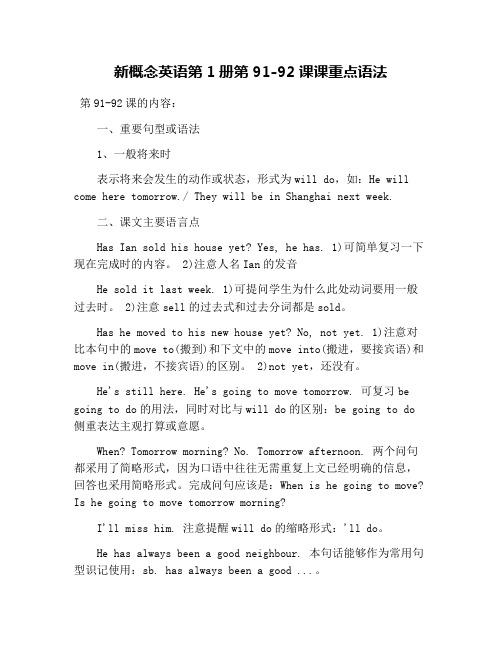
新概念英语第1册第91-92课课重点语法第91-92课的内容:一、重要句型或语法1、一般将来时表示将来会发生的动作或状态,形式为will do,如:He will come here tomorrow./ They will be in Shanghai next week.二、课文主要语言点Has Ian sold his house yet? Yes, he has. 1)可简单复习一下现在完成时的内容。
2)注意人名Ian的发音He sold it last week. 1)可提问学生为什么此处动词要用一般过去时。
2)注意sell的过去式和过去分词都是sold。
Has he moved to his new house yet? No, not yet. 1)注意对比本句中的move to(搬到)和下文中的move into(搬进,要接宾语)和move in(搬进,不接宾语)的区别。
2)not yet,还没有。
He's still here. He's going to move tomorrow. 可复习be going to do的用法,同时对比与will do的区别:be going to do侧重表达主观打算或意愿。
When? Tomorrow morning? No. Tomorrow afternoon. 两个问句都采用了简略形式,因为口语中往往无需重复上文已经明确的信息,回答也采用简略形式。
完成问句应该是:When is he going to move? Is he going to move tomorrow morning?I'll miss him. 注意提醒will do的缩略形式:'ll do。
He has always been a good neighbour. 本句话能够作为常用句型识记使用:sb. has always been a good ...。
标准新概念1册92课重点内容
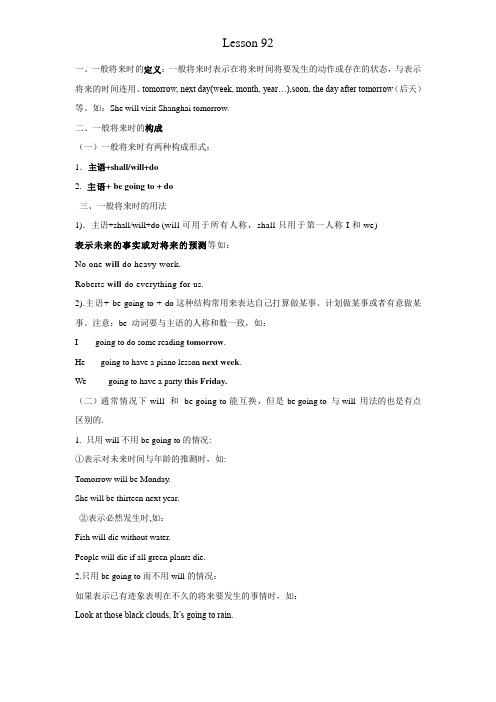
一、一般将来时的定义:一般将来时表示在将来时间将要发生的动作或存在的状态,与表示将来的时间连用。
tomorrow, next day(week, month, year…),soon, the day after tomorrow(后天)等。
如:She will visit Shanghai tomorrow.二、一般将来时的构成(一)一般将来时有两种构成形式:1.主语+shall/will+do2. 主语+ be going to + do三、一般将来时的用法1).主语+shall/will+do (will可用于所有人称,shall只用于第一人称I和we)表示未来的事实或对将来的预测等如:No one will do heavy work.Roberts will do everything for us.2).主语+ be going to + do这种结构常用来表达自己打算做某事、计划做某事或者有意做某事。
注意:be 动词要与主语的人称和数一致,如:I ___ going to do some reading tomorrow.He___ going to have a piano lesson next week.We ____ going to have a party this Friday.(二)通常情况下will 和be going to能互换,但是be going to 与will 用法的也是有点区别的.1. 只用will不用be going to的情况:①表示对未来时间与年龄的推测时,如:Tomorrow will be Monday.She will be thirteen next year.②表示必然发生时,如:Fish will die without water.People will die if all green plants die.2.只用be going to而不用will的情况:如果表示已有迹象表明在不久的将来要发生的事情时,如:Look at those black clouds, It’s going to rain.1.预习93-94课。
新概念英语第一册91-92课
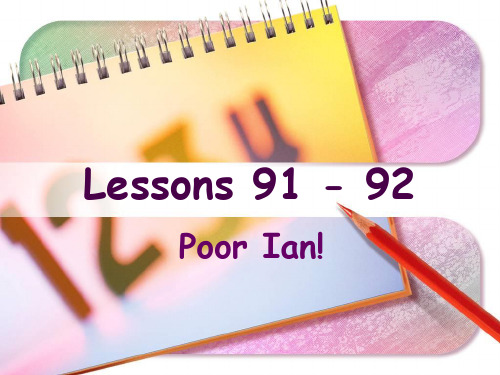
Poor Ian!
New words and expressions
still adv. move v. miss v. neighbour n. person n. people n. poor adj.
还,仍旧 搬家 想念,思念 邻居 人 人们 可怜的
引导宾语从句的关联词有从属连词,疑问代词, 疑问副词,缩合连接代词,缩合连接副词等。
Grammar--宾语从句
I am afraid that you can't see him today. 我恐怕你今天见不到他。 (关联词是从属连词that)
在非正式文体中关联词that常被省去。 eg:I hope you can come tomorrow. 我希望你明天能够来。 (that省略)
JENNY:
No, not yet. He's still here. He's
going to move tomorrow.
move to 搬家到... eg:All her family have moved to the US.
她全家人都已经搬到美国去住了。
完整的回答: He hasn't moved to his new house
1)一般将来时表示将来某一时刻的动作、状态以 及打算。该时态一般与表示将来意义的时间状语 连用。
tomorrow this month the day after tomorrow next week in two days' time from now on in the future
Grammar--宾语从句
用作宾语的从句叫做宾语从句,即充当宾语成份 的不是一个单词或词组,而是一个句子。
新概念英语第一册91-92课讲课讲稿

★miss v. 想念,思念 ① v. 想念,惦念
• 我想你 • I missed you.
• I’ll miss him. = I will miss him • I miss home very much. I miss you because I missed you.
式persons people 通常是人的统称。
• When will the new people move into this house? move to = move into 搬进
people = neighbours 她是这个职位的合适人选。 She’s the right person for this job. 公园里有很多人。 There’re a lot of people in the park.
• He’s going to move tomorrow. be going to do 计划、打算做某事。bour. 现在完成时
指Ian自从在这住开始到现在一直都很好 • He’s a very nice person. 表达人的人品很好可以用good或nice。 person 强调的个体的人,可以有复数形
• He is sitting still. • 他一动不动地坐着。 • 病人安静地躺着。
• The patient is lying still.
• ★move v. 搬家;感动 • 这个故事感动了我。
• This story moves me. • move to 搬到……地方 • move in 搬进 • move out 搬出来 • move away 搬走 • 我们下个月将搬到乡下
新概念第一册第91-92课重点知识

Lesson 91-92 Has Ian sold his house yet?伊恩把他的房子卖了吗?Has he moved to his house yet?他搬到他的房子里去了吗?He has always been a good neighbour.他一直都是一个好邻居。
We will all miss him我们都会想念他的。
When will the new people move into this house?什么时候新的人会搬进这栋新房?I think they will move in the day after tomorrow.我想他们会在后天搬进来。
注意这里有一个新词:will,以前学的be+going+ to+do表示一般将来时,未来打算或计划做什么,will也是一般将来时,表示未来即将做什么。
Please give him my regards.请代我问候他。
现在完成时的过去分词记忆:cut-cut-cut,put-put-put,read-read-read,set-set-set,shut-shut-shut;do-did-done,come-came-come,giv e-gave-given,swim-swam-swum,take-took-taken;eat-ate-eaten,go-went-gone,rise-rose-risen,see-sa w-seen,speak-spoke-spoken.你能找出他们的规律吗?千万不要死记硬背,找出规律是门道。
新一册91-92知识点
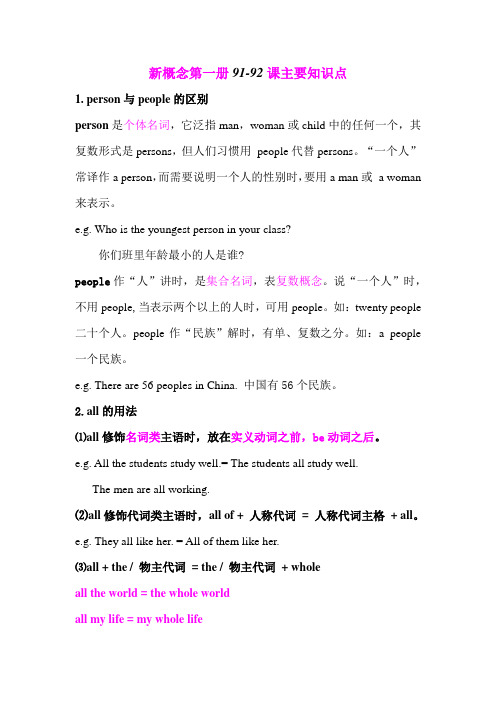
新概念第一册91-92课主要知识点
1. person与people的区别
person是个体名词,它泛指man,woman或child中的任何一个,其复数形式是persons,但人们习惯用people代替persons。
“一个人”常译作a person,而需要说明一个人的性别时,要用a man或 a woman 来表示。
e.g. Who is the youngest person in your class?
你们班里年龄最小的人是谁?
people作“人”讲时,是集合名词,表复数概念。
说“一个人”时,不用people,当表示两个以上的人时,可用people。
如:twenty people 二十个人。
people作“民族”解时,有单、复数之分。
如:a people 一个民族。
e.g. There are 56 peoples in China.中国有56个民族。
2.all的用法
⑴all修饰名词类主语时,放在实义动词之前,be动词之后。
e.g. All the students study well.= The students all study well.
The men are all working.
⑵all修饰代词类主语时,all of + 人称代词= 人称代词主格+ all。
e.g. They all like her. = All of them like her.
⑶all + the / 物主代词= the / 物主代词+ whole
all the world = the whole world
all my life = my whole life。
新概念第一册英语Lesson91-Lesson92课件
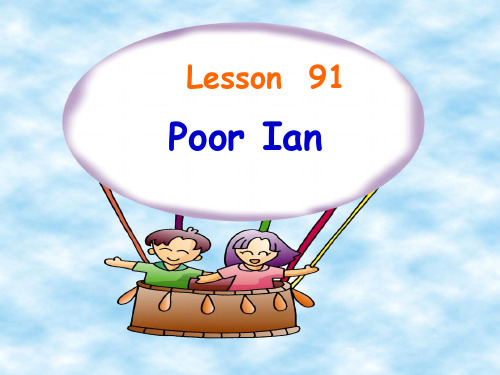
二、句型转换
• 1. I will go to Beijing tomorrow.(同义句) • 2.He will leave next month. (同义句) • A: He _____ ______ ______ leave next month. • B: He ______ ________ next month. • 3. We will have our lunch together. (一般疑问句) • 4.They will move to their new house next month. • (否定句)
at 12:00.
一般将来时的构成(二)
• 肯定句:主语+will+动词原形 • will为助动词,与情态动词用法相同,与动
词原形构成谓语,不需要根据人称进行变 化。 • 缩写:I will=I’ll • she will = she’ll • he will=he'll • they will= they’ll
Lesson 91
Poor Ian
★move
• 1. v. 搬家 • 短语: • move to/into +地点 搬到……地方 • move in 搬进(后面不能接宾语)
• 2.感动 • This story moves me.
★miss
① v. 想念,惦念 miss+人 想念某人 I miss my grandmother very much.
三、时态综合练习 --- 用所给词的适当形式填空
• 1.My father (go) back next Sunday. Then he can take me to the Great Wall.
• 2.Peter (go) back home at seven this evening.
新概念英语第一册92课
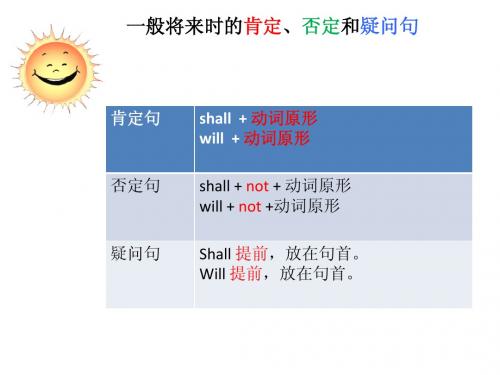
She telephoned him last night.
And she will telephone him tonight. We swept the floor last week. And we will sweep the floor this week.
③结构: 主语+助动词will/shall+动词原形(shall可用于第一人称I, we) I will go to America tomorrow. 明天我将去美国。 Jack will move into his new house tomorrow morning. 今晚杰克将要搬进新家。 ★变疑问句 Will you go to America tomorrow? Will Jack move into his new house tomorrow morning? ★变否定句(shan’t/ won’t) I will not go to America tomorrow. Jack will not move into his new house tomorrow morning. ★肯定回答及否定回答 Yes, I will. / No, I will not. Yes, he will. / No, he will not. ★特殊疑问句 When will you go to American? When will Jack go to American?
Lesson92
When will …?
句型操练:
When will + 主语+动词(动词短语)?
it 主语 you she rain work 动词 finish leave
she When will you it
新概念英语第一册(美音版)Lesson92听力

⼀般将来时:表⽰打算或将来要做的事情主语 + will/shall + v.will ⽤于任何⼈称shall 只⽤于第⼀⼈称will not = won'tshall not = shan'tmove 搬家,移动move to 搬到某地move in 搬进(强调结果)move into 搬进(强调过程)move out 搬出sold 过去式Ian sold his house last week.Ian has already sold his house.Has Ian moved to his new house yet?No, he hasn't moved to his new house.He will move to his new house tomorrow.the new peoplethe day after tomorrowThe new people will move into the house the day after tomorrow. leaveI will leave tomorrow.Will you leave next week.miss 想念,思念I will miss you.Will you miss me?I won't miss you.neighbour 邻居all the neighbours 所有的邻居All the neighbours will miss Ian.Ian is a good neighbour.Ian was a good neighbour.Ian has always been a good neighbour.We will all miss him.was/beenLucy is a good wife.She was a good wife.She has always been a good wife.将来时的时间todaytomorrowthe day after tomorrowthis morningtomorrow morningthe day after tomorrow in the morningthis afternoontomorrow afternoonthe day after tomorrow in the afternoonthis eveningtomorrow eveningthe day after tomorrow in the eveningtonighttomorrow nightthe night after nextExerciseswe will = we'llthey will = they'llhe will = he'llshe will = she'llit will = it'llI will = I'llExercises B:Example:It rained yesterday.Yes, and it will rain tomorrow, too.rain/ snow/ leave/ get up/ arrive/ finish work/ have a holiday/ drive Home have a haircut/ telephone me/ have a shave/ pack his bags/ sweep the floor paint this room/ repair my car/ make an appointment1 Yes, and it will snow tomorrow, too.2 Yes, and he will get up late tomorrow, too.5 Yes, and she will drive to London tomorrow, too.6 Yes, and she will telephone him tomorrow, too.7 Yes, and he will have a shave tomorrow, too.8 Yes, and she will sweep the floor tomorrow, too.将来时1 be going to ……2 现在进⾏时的第三种情况3 ⼀般现在时(表⽰移动的动词)I will leave tomorrow.I am going to leave tomorrow.I am leaving tomorrow.I am about to leave.I am to leave tomorrow.⼀般疑问句:Do you come?Do you come tomorrow?(也可表⽰将来)be to do sth.be about to do sth.(介词短语)She is (about) to come/leave/move.be going to do sth.be doingbe to do sth.。
新概念一册Lesson 92 122习题

新概念一册Lesson 92 122习题新概念一册lesson92-122习题第91课------第92课一.用所给动词的正确形式填空.1.他明天早上做什么?2.我们现在还没有吃午饭。
3.whendidhe_________(telephone)meyesterday?4.isyourbrother_________(write)alet ter?5.don’t_________(close)thewindow.二.单项选择.1.我们非常想念你。
a.allwillb.willallc.willeveryd.everywill2.we’llgotoshanghaitheday_____tomorro w.a、 B之后。
之前。
工业落后。
你的房子好了吗?a.sellingb.soldc.selld.selled4.whenwillthenewpeoplemove______thishouse?a.intob .ontoc.ford.on5.whendidyoudoit?i_____itamomentago.a、哈夫多涅布。
amdoingc。
唐纳德。
做lesson93---------lesson94写出下列动词的过去式、过去分词和现在分词。
1.出售2.出售。
小姐3。
移动4。
返回5。
fly______________III单选1.weusuallystay____homeonsunday.a.inb.toc.ford.at2.下个月我们将前往度假酒店。
a、在…之前。
toc。
工业落后。
目前有网络。
a、atb。
toc。
4分钟。
多大?第三十二条______a.yearoldb.oldyearc.yearsoldd.oldyears5.heisgoingtofly_____tokyo.a、英国广播公司。
toc。
atd。
对于lessons95-----96I单词辨别:选择带下划线的部分,从其他三个单选单词中读出两个不同的单词1.mywatchisfifteenminutes________.a、慢吞吞的。
- 1、下载文档前请自行甄别文档内容的完整性,平台不提供额外的编辑、内容补充、找答案等附加服务。
- 2、"仅部分预览"的文档,不可在线预览部分如存在完整性等问题,可反馈申请退款(可完整预览的文档不适用该条件!)。
- 3、如文档侵犯您的权益,请联系客服反馈,我们会尽快为您处理(人工客服工作时间:9:00-18:30)。
5.She drove to London yesterday. _________________________________ 6.She telephoned him yesterday. _________________________________ 7.He had a shave yesterday. _________________________________ 8.She swept the floor yesterday. _________________________________
2.She will come this evening.
__________________________________
3.It will snow tonight.
__________________________________
4.He will not believe me.
__________________________________
课堂练习
(复习L91-L92)
Ⅳ Rewrite the sentences according to the requests. (改写下列句子) 1. Lucy and I have had lunch. (改为否定句) ___________________________________________________ 2. They have seen the film. (改为一般疑问句,并做出否定回答) __________________________________________________ 3. Jack has gone to England. (改为否定句) ___________________________________________________ 4. Have you read this book yet? (改为肯定句) ___________________________________________________
有个约会。
A.Rewrite these sentences. 模仿例句改写以下句子。
Example: It will rain tomorrow.
It'll rain tomorrow.
1.He will arrive tomorrow morning. __________________________________
4 T:The 2nd picture. It snowed yesterday. S:Yes, and it'll snow again tomorrow.
昨天下雪了。 是的,明天还会下雪。
5 T:The 6th picture. He finished work late yesterday. 他昨天工作完成的很晚。 S:Yes, and he'll finish work late again tomorrow. 是的,明天他也会很晚完成工作。
Written exercises 书面练习
10 T:The 16th picture. He made an appointment yesterday. 他昨天有个约会。 S:Yes, and he'll make an appointment again tomorrow. 是的,明天他还要
6 T:The 15th picture. They repaired his car yesterday.
他们昨天修理了他的车。
S:Yes, and they'll repair his car again tomorrow. 是的,明天他们还会修理他的车。
7 T:The 10th picture. She telephoned him yesterday. 她昨天给他打了电话。 S:Yes, and she'll telephone him again tomorrow. 是的,明天她也会给他打电话。
will 提前,放在句首/Be + 主语 + going to + 动 词原形 ?
一般将来时时间状语
1.T :Look at the 1st picture. It rained yesterday. 昨天下雨了。 S:Yes, and it'll rain again tomorrow. 是的,明天还会下雨。.
8 T:The 8th picture. They drove home late yesterday. 他们昨天开车回家很晚。 S:Yes, and they'll drive home late again tomorrow. 是的,他们明天还要开车回家很 晚。
9 T:The 11th picture. He had a shave yesterday. 他昨天刮脸了。 S:Yes, and he'll have a shave again tomorrow. 是的,明天他还要刮脸。
NCE 1 Lesson 92
When will...?什么时候要...?
一般将来时
present
future
一般将来时表示将来某一时刻的动作、状态以及打算。一般与表示将来意义的时间状语连用。
肯定句
否定句 疑问句
will + 动词原形/be going to + 动词原形
will + not +动词原形/be not going to + 动词原 形
2. T:The 4th picture. He got up late yesterday. 他昨天起床晚了。 S:Yes, and he'll get up late again tomorrow. 是的,明天他还会晚起。
3.T:The 13th picture. She swept the floor yesterday. 她昨天擦地板了。 S:Yes, and she'll sweep the floor again tomorrow. 是的,明天她也会擦地板。
Rewrite these sentences. 模仿例句确认以下的每一句话。
过去式
过去时间状语
Eg:It rained yesterday.
Yes, and it will rain tomorrow, too.
一般将来时
将来时间状语
1.It snowed yesterday. ________________________________ 2.He got up late yesterday. ________________________________ 3.He arrived late yesterday. ________________________________ 4.He finished work late yesterday. ________________________________
